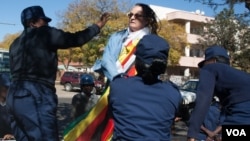More than 10 people have been arrested in Zimbabwe’s second largest city, Bulawayo, after staging a public protest against the failure of President Robert Mugabe’s government to address social and economic issues gripping the nation.
The protesters, who were arrested outside Queens Sports Club where Zimbabwe is clashing with New Zealand in a cricket match, included Jennie Williams of Women of Zimbabwe Arise, several members of Tajamuka-Sesijikile Campaign, university graduates affiliated to #thisgown movement and several others.
Williams was bundled into a police vehicle by female police details after she had blocked the main entrance in protest against being denied entry to watch the match as police accused her of being a nuisance.
Williams, who was holding a photo-copied five dollar note, said she wanted to use the “money” for entrance fees, arguing that it is valid currency as it is similar to the bond notes that government intends to introduce in October.
“This paper is what you are giving us in October. This is a bond paper and you are giving us bond notes in October, so, what’s wrong with this one. It even has a better message than yours will have … a hungry nation is an angry nation,” Williams shouted, in an apparent address to the police who wanted her to leave the place.
Programs manager Tineyi Mukwewa of the Abammeli Lawyers for Human Rights told Studio 7 that several lawyers were in touch with the police as part of efforts to secure the release of arrested protesters.
Scores of Zimbabweans sang the national anthem for some minutes during the test match to show their disgruntlement over the situation in the country.
The cricket lovers also sang national anthem in the 36th over of the match to show their dismay over President Mugabe’s 36 years in power.
The timing of the singing was in response to Pastor Evan Mawarire’s recent call for Zimbabweans to sing the national anthem to protest against 36 years of alleged misrule by President Robert Mugabe and his Zanu PF party.
In a video published recently, Pastor Mawarire who is in South Africa said the gesture was also meant to be in honour of former Zimbabwe national team cricketers Andy Flower and Henry Olonga that staged the black armband protest during the 2003 International Cricket Council World Cup co-hosted by Zimbabwe and South Africa.
Flower and Olonga wore the black arm bands as a sign of “mourning the
death of democracy in Zimbabwe.”
A white elderly lady who only identified herself as Rose told Studio 7 that she had come to the match not only because she is a cricket fan but also in solidarity with the protesters.
She said the socio-economic situation in Zimbabwe has become dire and ordinary
Zimbabweans can no longer cope.
“I just feel we’ve reached the bottom of the barrel; we’ve got to come up somehow but I don’t know how and I wouldn’t even want to hazard a guess. I think everyone is tired now…with the situation at the boarder now –you can’t bring in this, you can’t bring in that ... It makes people not be able to use their hard earned money to take care of
their families the way they should and it stretches everyone to the limit,” Rose said.
She said she believed that the protest at the match, though small, had a significant impact as the game was being beamed live on television in many countries.
Another cricket fan, Nqabutho Ndlovu, echoed similar sentiments saying the protests that have been going on throughout the country will gain momentum and have the desired effect of ejecting Mr. Mugabe from power.
“A revolution does not occur overnight. It is achieved after some blood has been lost, after many citizens have been arrested and others have been driven into exile. History has always shown us that. It is my belief that one day we will achieve what we want because we can’t go on like this,” said Ndlovu.




